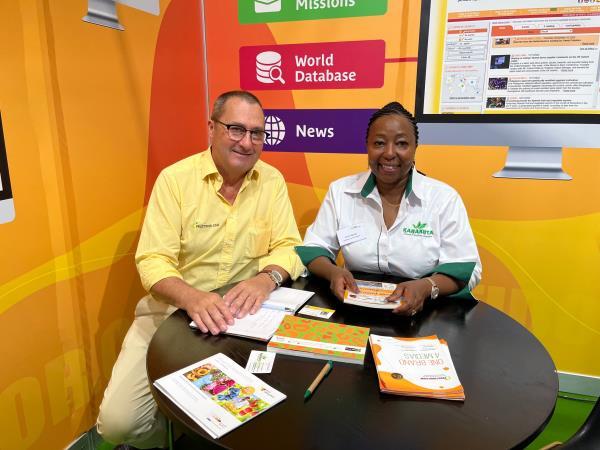BIG interview with Karakuta Farm Kenya, avocado and fresh herbs all year round.
Kenya
Friday 31 May 2024
PE
Interview with Grace Ngungi and Christophe Durrieu.
Established by Ms Grace in 2017 with 180 acres, her strategy is to integrate the entire value chain from nursery to packaging and importation for greater sustainability. ‘Our goal is to have 200 acres of avocados in production and integrate other farmers from our Kiambu location’ reported Grace Ngungi the founder and owner of Karakuta Farm, interviewed by Fructidor president Christophe Durrieu.
A business model designed for greater social impact
‘We are very lucky that our farm is located 40 km from Nairobi, on a single site, which used to be a coffee plantation owned by the family’ reported Miss Grace. Her project to set up an avocado farm was born out of her experience working with development programmes of international organisations. ‘This helped me to appreciate business models that create impact and alleviate poverty; businesses should not only focus on profits; they need to consider the environment in which they operate and the impact it has on communities; this is also important for sustainability.
Strengthened social and environmental commitment
Karakuta Farm is GlobalGAP certified, guaranteeing its strict adherence to best agricultural practices. SMETA certificates endorse its social and environmental systems and policies. In addition, part of its farms are certified organic. This supports a segment demanded by some of its customers. ‘The key to our business was to create farms that consistently deliver value to partners over the long term; we have invested in building relationships with our partners,’ explains Grace. More and more European customers are attracted by the sustainability factor. The Kenyan avocado proves to have a very low water footprint compared to dry production areas such as Malaga or Peru, due to the country's humid climate, located at the latitude of the Equator. Supplementary irrigation is only necessary for a couple of weeks during the 4 dry months of January, February, September and October.
Year-round supply of avocado and fresh herbs
Spain is so far the main destination for Karakuta avocados, followed by the UK, the UAE and the Netherlands. Last season, 400 tonnes of avocados were exported, and a 10% increase is forecast for 2024. The Kenyan harvest runs from March to July, with a second, short harvest coming from October to November and accounting for around 20% of annual volumes. ‘We continue our season in Tanzania from November to March, where we have an office, to supply our customers all year round,’ Grace reports. Fresh herbs are the other exported category, with Germany, the United Kingdom and the United Arab Emirates being the 3 main customers. The volumes transported weekly by air are about 10 tonnes of basil, 2 tonnes of chives, 500 kg/week of tarragon, 300 kg of thyme, 300 kg of mint, 200 kg of coriander, 200 kg of habanero chilli, plus 100 kg/week of lovege, oregano and sage each.
Integrated and sustainable
Karakuta also supports women farmers and smallholder farmers in the community. Some 1,500 farmers are currently supported, 70 per cent of whom are women. According to Grace, until the recent emergence of some large and medium-scale farmers like Karakuta, medium and small-scale farmers have been the basis of Hass agricultural production in Kenya. Karakuta's vision is to ensure that such farmers remain relevant as suppliers of Hass avocado to world markets. Karakuta Farm sees itself as an ‘uncle farm’ for other smaller farmers in the same growing area. ‘Our outgrower programme provides farmers with early maturing, high-yielding hybrid seedling varieties sourced from Brokaw Viveros in Spain. The seed technology requires less water and therefore reduces the water footprint. All this after technical training that reflects the specifications of our customers. With this kind of support, our small farmers can produce quality fruits that we offer to our customers as our own production,’ explains Grace, ’The size of our farm allows us to have our own packing house to be more efficient, unlike most farmers who need to work with separate packing houses. Karakuta plans to install a packaging centre on the farms in 2024/25.
Testing and multiplication of trees
Karakuta has established partnerships with certified nurseries such as Brokaw Viveros (Malaga) and has set up its own experimental farm to test and multiply the most productive and resilient clonal seedlings. ‘Our nursery is currently testing 3,000 different Hass avocado seedlings,’ Grace reports. Karakuta Farm has also started selling seedlings to farmers in other African countries, such as Tanzania, Uganda, Burundi and Ghana.
Ready for Asian markets
As a former British colony, the UK and Europe are our traditional markets. China and India are emerging markets, although the quality standards and health requirements are different,’ Grace explained. These markets will offer interesting opportunities as they have a large population base. For more information about buying avocados or Karakuta herbs, please send us an email on vv@fructidor.com





